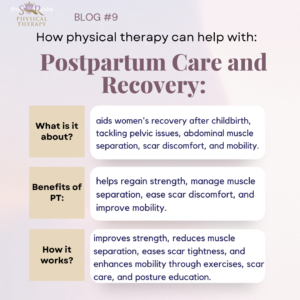
How Physical Therapy Can Help With: Postpartum Care and Recovery
By LaTonya Misters, PT, DPT, SOW & REAP Physical Therapy
Welcoming a new life into the world is a beautiful journey, but it can also bring significant changes to a woman’s body. Postpartum care and recovery are crucial aspects of the childbirth experience, and pelvic floor physical therapy plays a vital role in supporting mothers during this transformative time.
- Pelvic Floor Rehabilitation:
After childbirth, many women experience pelvic floor dysfunction, including weakened muscles, pelvic organ prolapse, and urinary or fecal incontinence. Pelvic floor physical therapy offers personalized rehabilitation programs to address these issues. Through targeted exercises, such as Kegels and pelvic floor strengthening exercises, we help mothers regain strength and function in their pelvic floor muscles.
Example:
Sarah, a new mother, experienced urinary leakage and pelvic discomfort after giving birth to her second child. Through pelvic floor physical therapy, she learned specific exercises to strengthen her pelvic floor muscles and improve bladder control. With consistent practice and guidance from her therapist, Sarah regained confidence and comfort in her daily activities.
- Diastasis Recti Management:
Diastasis recti, the separation of the abdominal muscles during pregnancy, is a common concern for many postpartum women. Pelvic floor physical therapy offers targeted interventions to address diastasis recti and promote optimal healing of the abdominal muscles. Through exercises focused on core stabilization and alignment, along with postural education, we assist women in closing the abdominal separation and restoring core strength.
Example:
Emily struggled with diastasis recti following the birth of her twins. With guidance from her pelvic floor physical therapist, she implemented a tailored exercise program that focused on strengthening her deep abdominal muscles and improving her posture. Over time, Emily noticed a significant reduction in the separation of her abdominal muscles and regained functional core strength, allowing her to engage in daily activities with greater ease.
- Scar Management:
Cesarean section or episiotomy scars can contribute to discomfort and restricted movement during the postpartum period. Pelvic floor physical therapy incorporates scar management techniques, such as massage and gentle stretching, to improve tissue mobility and reduce adhesions. By addressing scar tissue, we help mothers alleviate pain and optimize healing following childbirth.
Example:
Maria experienced tightness and discomfort around her cesarean scar months after giving birth. With the guidance of her pelvic floor physical therapist, she learned self-massage techniques and gentle stretching exercises to improve the flexibility of her scar tissue. As a result, Maria experienced reduced pain and increased mobility, allowing her to fully engage in caring for her newborn.
- Optimizing Functional Mobility:
The physical demands of caring for a newborn can place strain on a mother’s body, particularly her back, neck, and shoulders. Pelvic floor physical therapy addresses musculoskeletal imbalances and promotes optimal body mechanics to prevent injury and improve functional mobility. By incorporating exercises to strengthen the postural muscles and techniques for lifting and carrying, we empower mothers to navigate the physical challenges of motherhood with greater ease.
Example:
Jessica struggled with back pain and fatigue while caring for her infant daughter. Through pelvic floor physical therapy, she learned proper body mechanics for lifting and breastfeeding, along with exercises to strengthen her back and core muscles. With consistent practice and support from her therapist, Jessica experienced reduced pain and improved energy levels, allowing her to enjoy bonding with her baby without discomfort.
In summary, pelvic floor physical therapy offers comprehensive support for women during the postpartum period, addressing a wide range of physical challenges and promoting optimal recovery. By empowering mothers with personalized rehabilitation programs and practical strategies, we strive to enhance their well-being and quality of life as they navigate the joys and challenges of motherhood.
Ready for better pelvic health? Click the button below! And be the first one to receive our blogs.
Our skilled specialists provide personalized, evidence-based care for all pelvic floor issues. Whether it’s pain, leakage, or dysfunction, we’re here to help you sow the seeds of pelvic health. Schedule your appointment today for a healthier, happier you! 🌱🌟
